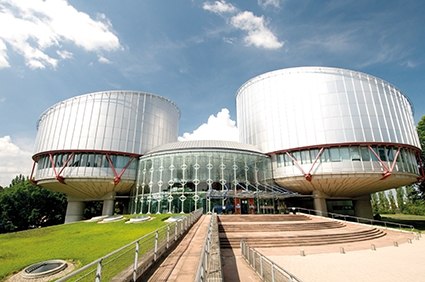Human Rights Court in Strasbourg Rules on Russia vs Georgia
After years of litigation, the final hearing in the European Court of Human Rights (ECHR) took place this Wednesday, May 23, in the case of Georgia v. Russia (II). A Georgian delegation attended the hearing in Strasbourg, headed by Deputy Justice Minister Gocha Lortkipanidze.
Georgia is accusing Russia for the second time of violating the Articles of the European Convention on Human Rights, to which both countries are party. After the Georgia-Russia War of August 2008, Georgia filed an application with Europe’s top human rights court against Russia on August 11, 2008. On April 3, 2012, the case was sent to the Grand Chamber for consideration. Georgia accuses Russia of committing serious aggression during and after the 2008 war, and violating human rights and fundamental freedoms guaranteed by the European Convention on Human Rights and its Protocols, specifically the articles pertaining to the right to life, prohibition of torture, inhuman and degrading treatment, freedom and security, and freedom of movement.
At the final hearing on Wednesday, a lawyer for the Georgian side, Ben Emerson, argued that Russian forces bombed villages, burned down homes, and terrorized civilians during the war in Georgia’s Tskhinvali region. The brief but deadly conflict resulted in the occupation of Georgian territory and the establishment of a barrier separating many Georgians from their lands, homes, and places of worship and burial. Georgian representatives used the term ‘ethnic cleansing’ to describe the forced expulsion of ethnic Georgians from their homes in South Ossetia, and the targeting of ethnically Georgian villages.
Russia fully denies the accusations against them. On behalf of the Russian government, lawyer Mikhail Galperin emphasized South Ossetia’s right to self-determination, and claimed that the 2008 conflict was initiated by Georgia in an attempt to enforce South Ossetia’s status as part of Georgia, which was artificially created in 1922 by Josef Stalin. Galperin said, "no one asked the Ossetians if they wanted to become Georgians."
After the 2008 war, Tbilisi and Moscow severed diplomatic ties as Russia recognized South Ossetia and Abkhazia as independent states, although almost every other country in the world recognizes the territories as Georgian. In 2009, a European Union investigation found Georgia to be at fault for "illegally" starting the war with Russia, but said that Moscow then "violated" international law by invading its neighbor in response to the attack.” Both sides interpreted the investigation’s findings as positive. Then-Minister for Reintegration Temur Iakobashvili said, "The report proves that Russia was all the time preparing this war and August 7 and 8 were the culmination," while a Kremlin spokesperson said, "We can only welcome that the commission found that the war was started by Georgia."
The ECHR said it had heard from 33 witnesses: 16 summoned by Georgia, 12 by Russia, and six directly by the court. Chairman of Parliament Irakli Kobakhidze said that, “All relevant measures will be taken to ensure that the Strasbourg Court delivers a judgment in favor of Georgia.”
Davit Bakradze, leader of the European Georgia political party, believes Georgia’s chances for success are high, but could be hindered by “the statements made by the current government of Georgia, according to which Georgia is guilty of starting the war. I hope that these statements cannot change the overall picture and I hope that the government and the Ministry of Justice will do their best to ensure that the European Court delivers a judgment that corresponds to the historical truth,” Bakradze said. A final verdict is not expected before the end of the summer.
The first case Georgia brought against Russia concerned the mass arrests and collective expulsion of Georgia citizens from Russia in 2006, when more than 2,300 Georgians were detained and forcibly deported or expelled. Georgia argued that the deportations were in retaliation for the arrest of four Russian intelligence officers in Tbilisi in September 2006, while Russia argued that the deportations were a routine enforcement of its immigration policy. The ECHR eventually ruled in Georgia’s favor, and Russia was ordered to pay compensation.
While Russia is participating in the proceedings, the country is not expected to uphold the court’s ruling if it is unfavorable. In 2015, the Duma passed a law allowing Russia's Constitutional Court to disregard international court rulings if Russia believes they violate its constitution. The Council of Europe has little recourse to enforce its rulings.
In March, the Russian RIA news agency reported that Russia was considering withdrawing from the European Convention on Human Rights and ending cooperation with the European Court of Human Rights, as many of its decisions run counter to Russian interests.
By Samantha Guthrie












